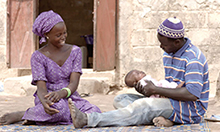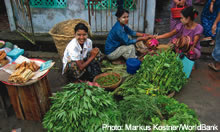Gender Equity for Improved Nutrition
Empowered women and engaged men provide better nutrition for the whole family.
Challenge
"When women are empowered, educated, and can earn and control income, infant mortality declines, child health, nutrition, and development improve, agricultural productivity rises, population growth slows, economies expand, and cycles of poverty are broken."
USAID's Multi-Sectoral Nutrition Strategy
Gender inequity and malnutrition are inextricably linked—when women are educated and empowered, they are able to provide better care and food for themselves, their children, and their families. Gender-equitable communities and households are crucial to catalyze and sustain improvements in nutrition.
Recognizing that gender equity is not a primary nutrition outcome but a crucial component of the enabling environment, the challenge is often which gender-related interventions have the most impact on improving nutrition and identifying when to introduce them in specific nutrition programs. While gender equity and women's empowerment are not explicit SPRING project objectives, we are committed to strengthening the enabling environment for nutrition by making gender equity a key pillar of our programs.
SPRING's Approach
Our work at the intersection of nutrition and gender equity centers on empowering women and engaging households to create an enabling environment for sustainable nutrition. Taking a multi-pronged approach, we apply a gender lens to designing and implementing programs, focusing on women and girls' right to optimal health and nutrition. Improving women and girls' nutritional outcomes also benefits their children's health, helping to break the intergenerational cycle of poor nutrition, poor health, and poverty.
Our gender-sensitive nutrition programs succeed because we engage whole households, not just women and girls. We appeal to key influencers from fathers and grandmothers to community leaders and elected officials. This inclusivity is key to speed progress towards needed behavioral and cultural changes.
SPRING ahead to discover how.
Working Multi-Sectorally
SPRING works through multiple sectors, including agriculture, health, and water, sanitation, and hygiene (WASH), to address the varied causes of malnutrition and gender inequity.
- Ghana and Senegal – SPRING introduced agricultural labor-saving technologies for crops traditionally grown and/or processed by women. These programs improve food safety, productivity, and income potential for female farmers, and allow these women more time and income to provide or seek better care for themselves and their families.
- Bangladesh – SPRING's Farmer Nutrition Schools (FNS) provided intensive training in nutrition, health, WASH, and agriculture for female farmers. SPRING has found that husbands in FNS communities actively support their wives' FNS activities, helping them with gardening and child care. A recent assessment showed that female FNS participants had higher empowerment scores than non-participants, potentially due to the integration of joint decision-making and leadership skills in this multi-sectoral program.
SPRING's "Women's Empowerment Pathway" illustrates the pathways through which agriculture can strengthen nutrition. The framework draws attention to the role that agriculture can play in empowering women and improving family nutrition. SPRING put these pathways into practice assessing the impact of two projects in Rwanda along the women's empowerment pathway.
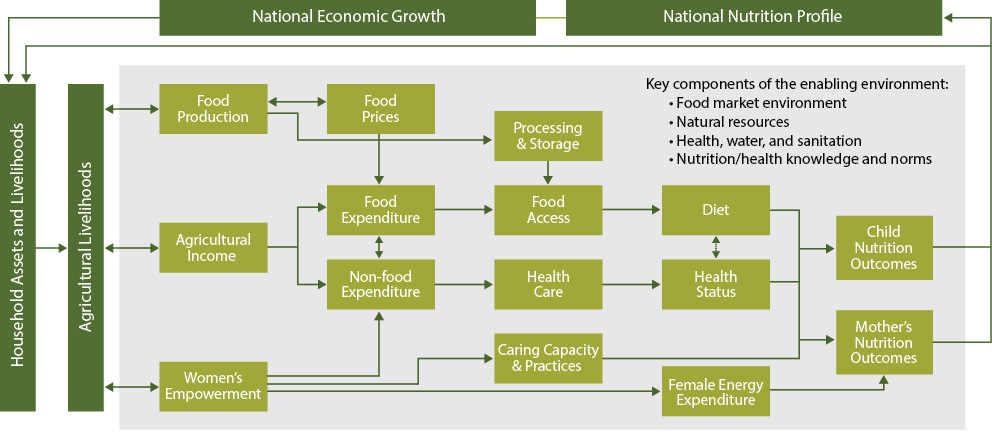
Engaging Whole Households and Communities
—Husband in Niger
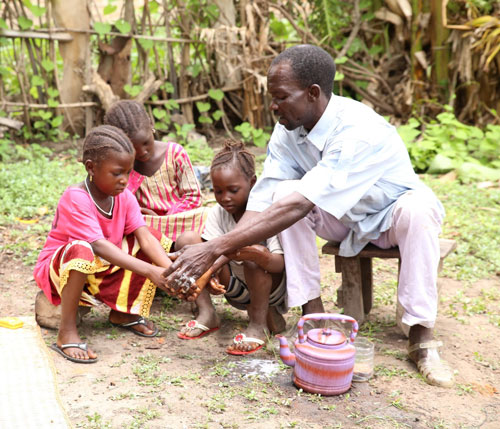
SPRING engages whole households and/or communities, including key influencers such as fathers, grandmothers, and community leaders, to create sustainable social support for gender equity and nutrition.
- Niger – Through community-led videos, SPRING models family members' support for gender equity and nutrition, including videos that show joint decision-making among husbands and wives, or husbands and mothers-in-law taking active roles in supporting women's and children's healthcare and nutrition. Results from a qualitative study of the impact of the videos on male involvement in maternal and child nutrition found that community video is a promising approach for strengthening spousal communication on important health issues.
- Uganda – SPRING's "Great Mothers, Healthy Children" program created videos tailored to mothers , women of reproductive age, and influencers, such as grandmothers, fathers, and grandfathers to engage all members of the community in improving maternal and child health and nutrition.
- Ghana – SPRING's "1,000 Day Household" approach mobilized whole households and communities to improve maternal and child nutrition, agriculture, and WASH behaviors. The program also piloted fathers’ groups, in which fathers in the community explore gender roles and discuss ways to be actively engaged in, and advocates for, the nutrition of women and children in their families and communities.
Focusing on Women and Girls
SPRING is committed to improving the nutrition outcomes of adolescent girls and women of reproductive age. We advocate for the health and wellbeing of these groups to sustainably improve nutrition for women and children worldwide.
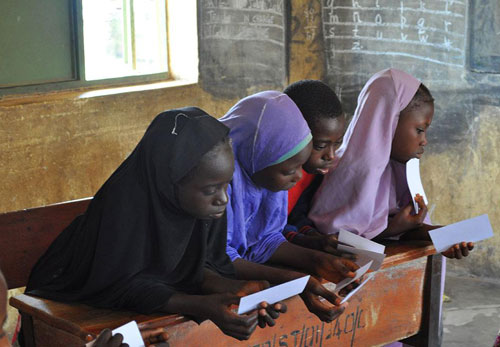
- Global – To fill a gap in global nutrition guidance for adolescents and women of reproductive age, we partner with global leaders in the field to identify key diet and eating practices for these groups and explore effective options for promoting those practices.
- Nigeria – We created a custom nutrition training package to teach orphans and other vulnerable children—including boys and girls from 3-17 years of age—about optimal nutrition practices.
- Kyrgyz Republic – Our Adolescent and Women's Nutrition and Anemia training curriculum for health care providers strengthens their ability to improve nutrition outcomes for these groups.
- Nigeria – Looking at some measures of women's empowerment during evaluation of Nigeria's Community Infant and Young Child Feeding (C-IYCF) program, we found that counselling groups that created voluntary savings groups allow women to start businesses or purchase more nutritious foods.
SPRINGING Forward
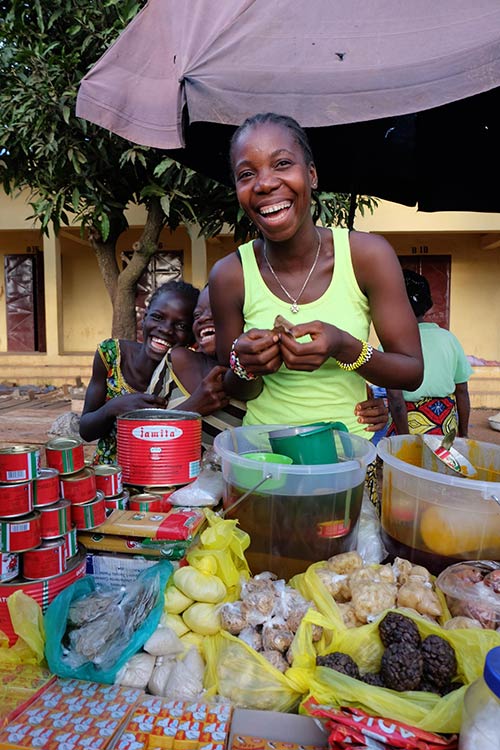
We're not standing still. We're looking to the future with new ideas and approaches to integrate gender equity into nutrition programs by:
- Integrating gender considerations from the design phase. SPRING routinely explores gender norms in formative research to promote gender equity within our programs.
- Advocating for integration of gender equity into WASH, agriculture, education, nutrition, health, and other sectors' programming.
- Testing new labor-saving agricultural technologies and ensuring that program approaches are sensitive to women's workloads and time constraints.
- Involving men in nutrition programs to ensure that they are advocates for, and actively support, gender equity and women's nutrition.
- Involving women from the community in program design and implementation to ensure that programs are appropriate within the community context and engage women in leadership roles.
- Engaging partners, including Ministry of Health and Family Welfare staff, who are addressing gender equity issues, gender-based violence, and family planning, and who support putting a nutrition perspective into their programming.
- Prioritizing adolescent girls' nutrition and creating guidance for nutrition programs to engage and meaningfully improve nutrition for this important population.
- Gender-based violence prevention should be integrated into nutrition programs to further improve gender equity. In addition, nutrition programs should advocate for policy-level changes to support gender equity, including support for girls' education, protecting girls from early marriage, and supporting women's access to, and control of, resources (Scaling Up Nutrition) [PDF, 3.4MB].
